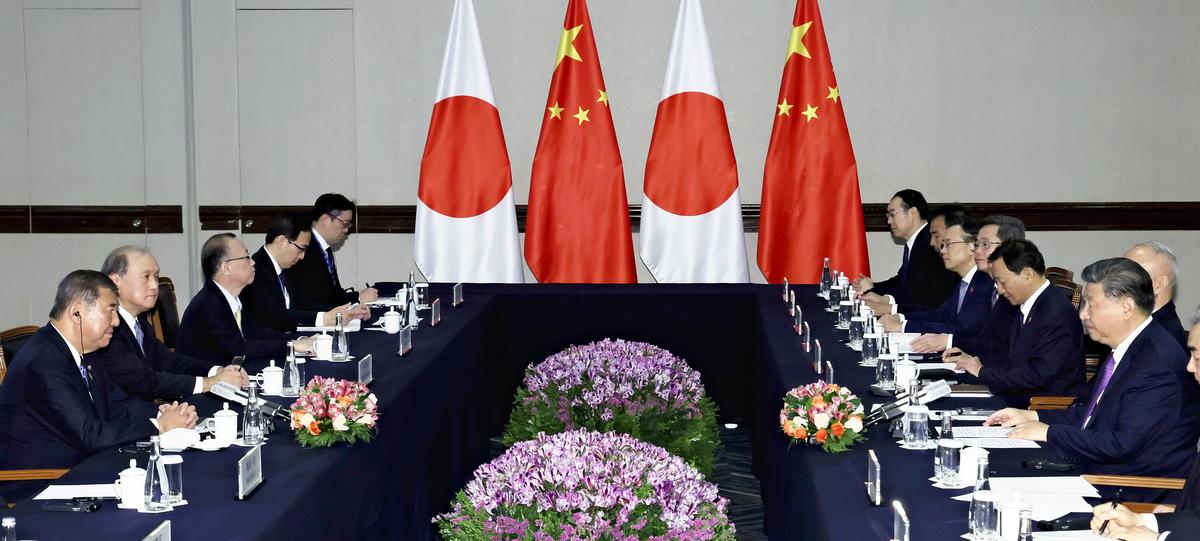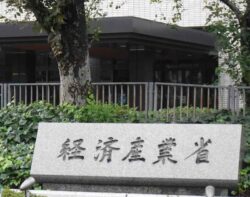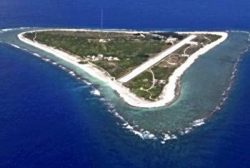Japan Prime Minister Keeps Mum on Dream of ‘Asian NATO’ During First Summit with Chinese President Xi Jinping

Prime Minister Shigeru Ishiba, left, meets with Chinese President Xi Jinping, right, in Lima on Friday.
12:40 JST, November 17, 2024
LIMA — Prime Minister Shigeru Ishiba did not speak about his desire for an Asian version of the North Atlantic Treaty Organization during his first summit meeting with Chinese President Xi Jinping in Peru on Friday.
The meeting represented the start of Ishiba’s full-fledged diplomatic activities involving China, and the two leaders agreed to accelerate dialogue to improve the bilateral relationship. Ishiba will be tested as to whether he can quickly realize mutual visits between high-ranking Japanese and Chinese officials, and whether diplomatic efforts can resolve individual issues such as China resuming imports of Japanese fisheries products.
“It was a very smooth exchange of opinions. I look forward to holding multiple talks in the future,” Ishiba told reporters afterward.
Just after taking office as prime minister, Ishiba met in October with Chinese Premier Li Qiang during a visit to Laos. However, it is essential to build a relationship with Xi, who dominates political power in China, to make progress in diplomacy.
Ishiba did not mention his strong desire to create an Asian version of NATO during the Friday talks with Xi. The Chinese side regards that initiative as an alliance against China, so Ishiba seemed to be trying to avoid a situation that might cause negative feelings for Xi.
Ishiba confirmed with Xi that they would promote a strategic, mutually beneficial relationship and implement an agreement aimed at China resuming imports of Japanese fisheries products.
Officials in the Japanese government also praised the outcome, saying it represented a certain degree of achievement. However, Xi did not say when the agreement will begin to be implemented. It is therefore uncertain whether China will actually resume imports.
Some in the Japanese government are still concerned. “[Xi] may want to keep the issue as a bargaining chip to shake up Japan,” according to one source.
There are numerous bilateral issues that need to be resolved, including the problem of Chinese military aircraft intruding into Japanese territorial airspace and securing the safety of Japanese nationals in China.
The Ishiba Cabinet aims to realize a visit to Japan by Li in tandem with a summit meeting among Japan, China and South Korea next year that Japan will chair. It will make efforts in the meantime to bring about mutual visits by Japanese and Chinese foreign ministers, a plan that was reconfirmed during the Friday talks.
Through these actions, the Ishiba Cabinet wants to form trusting ties between the two countries.
Top Articles in Politics
-

Japan PM Takaichi’s Cabinet Resigns en Masse
-

Sanae Takaichi Elected Prime Minister of Japan; Keeps All Cabinet Appointees from Previous Term
-

Japan’s Govt to Submit Road Map for Growth Strategy in March, PM Takaichi to Announce in Upcoming Policy Speech
-

LDP Wins Landslide Victory, Secures Single-party Majority; Ruling Coalition with JIP Poised to Secure Over 300 seats (UPDATE 1)
-

LDP Wins Historic Landslide Victory
JN ACCESS RANKING
-

Producer Behind Pop Group XG Arrested for Cocaine Possession
-

Japan PM Takaichi’s Cabinet Resigns en Masse
-

Man Infected with Measles Reportedly Dined at Restaurant in Tokyo Station
-

Israeli Ambassador to Japan Speaks about Japan’s Role in the Reconstruction of Gaza
-

Videos Plagiarized, Reposted with False Subtitles Claiming ‘Ryukyu Belongs to China’; Anti-China False Information Also Posted in Japan



























